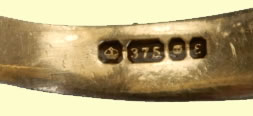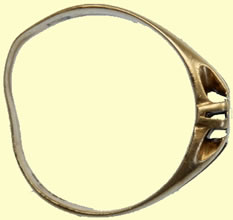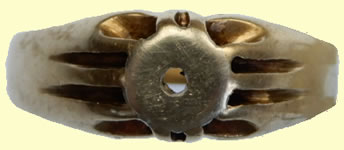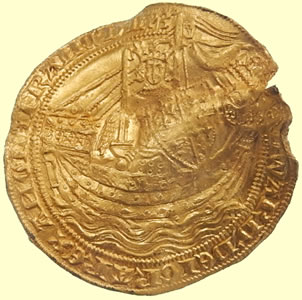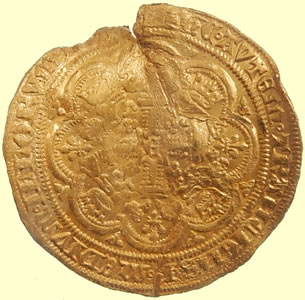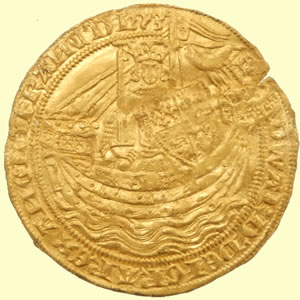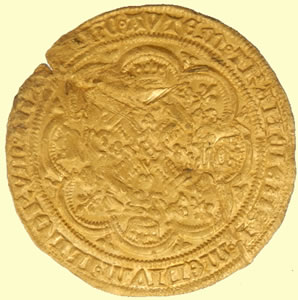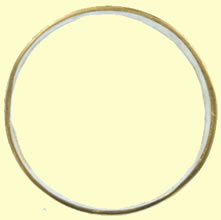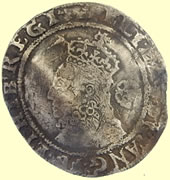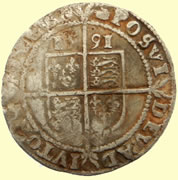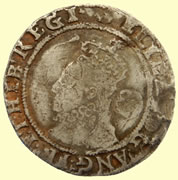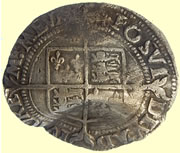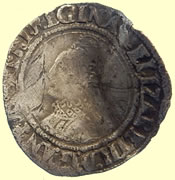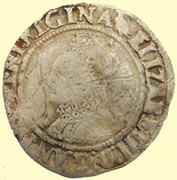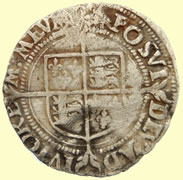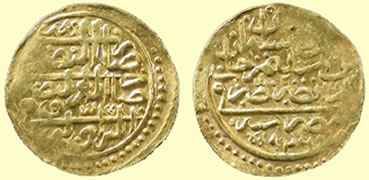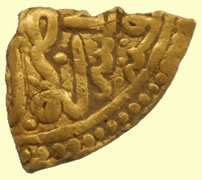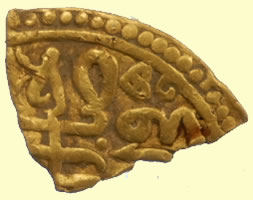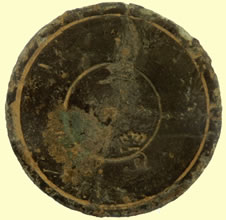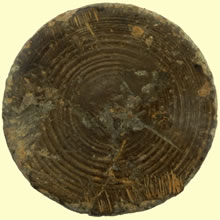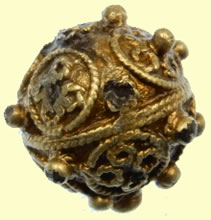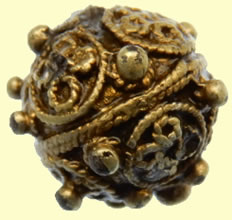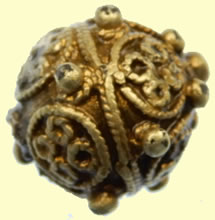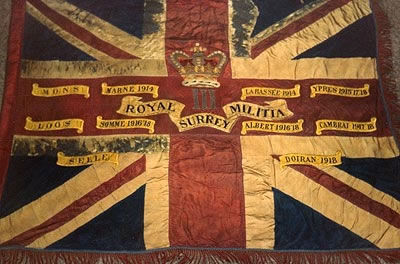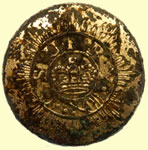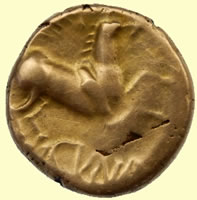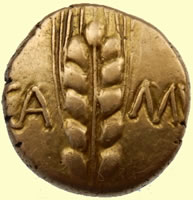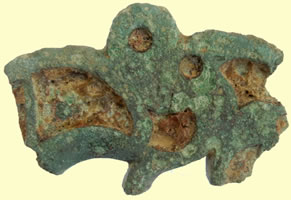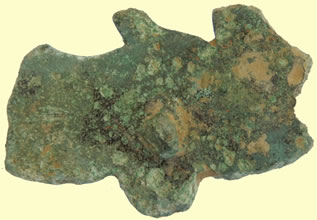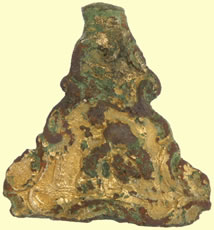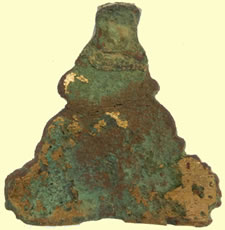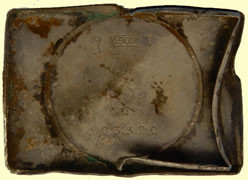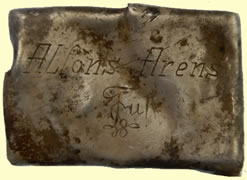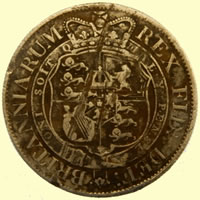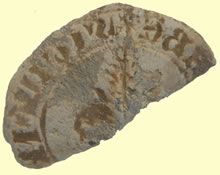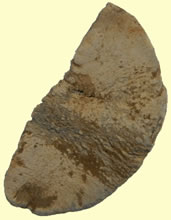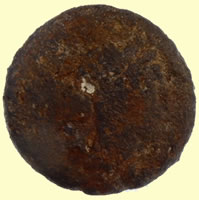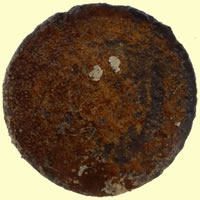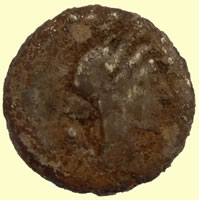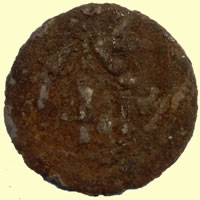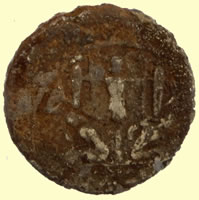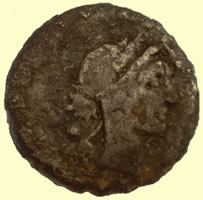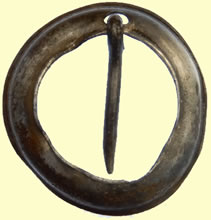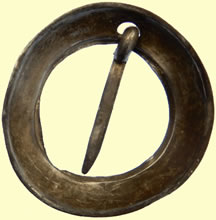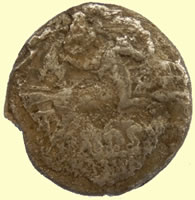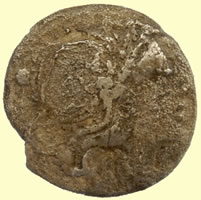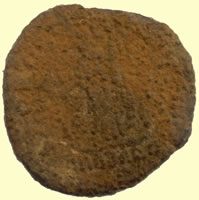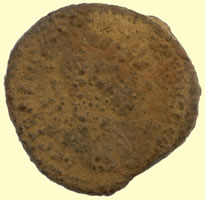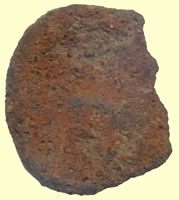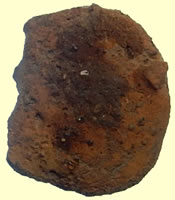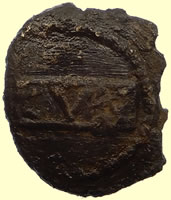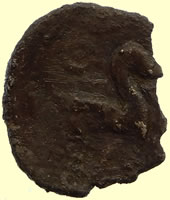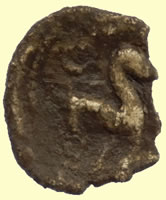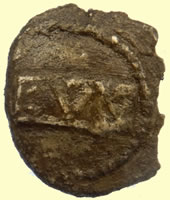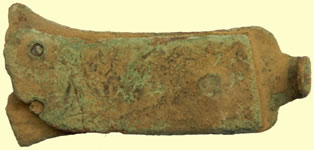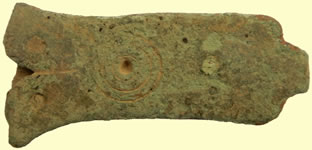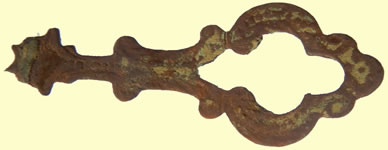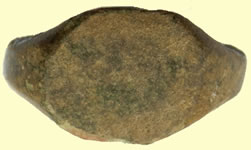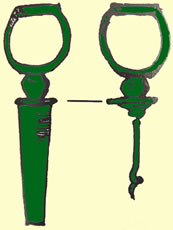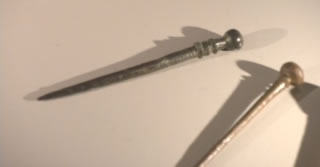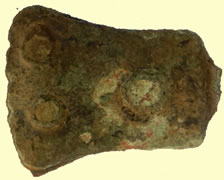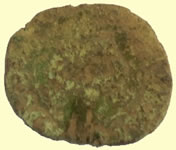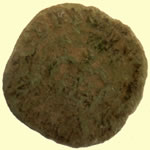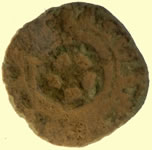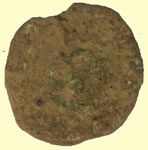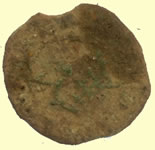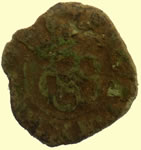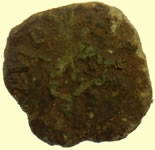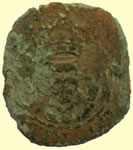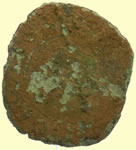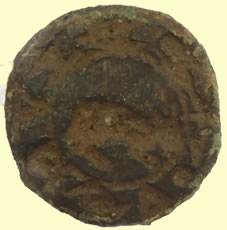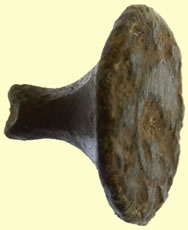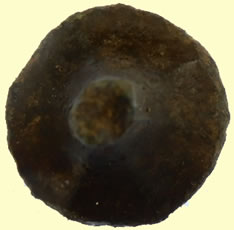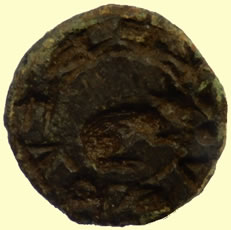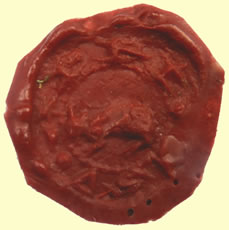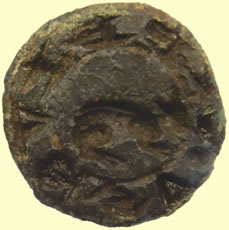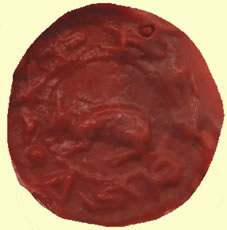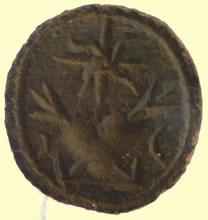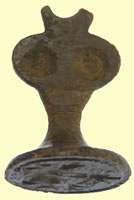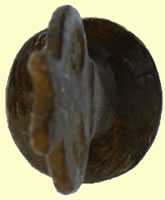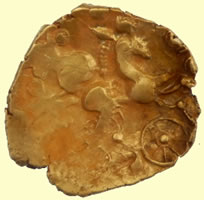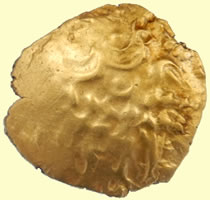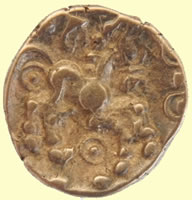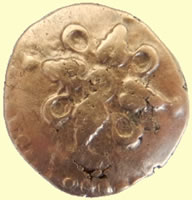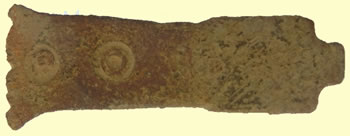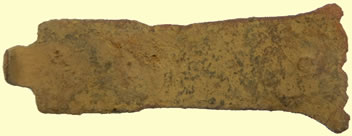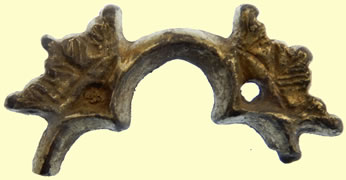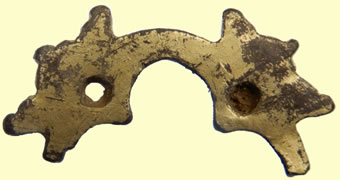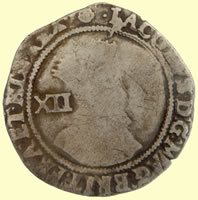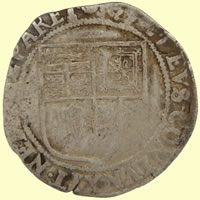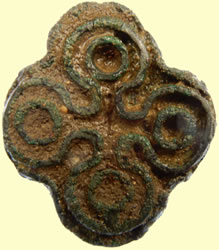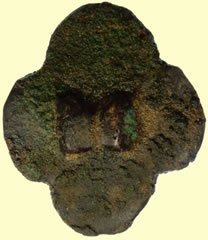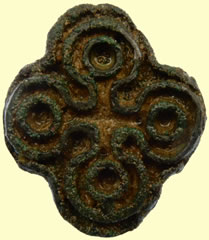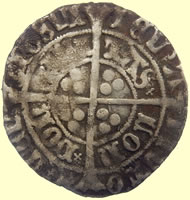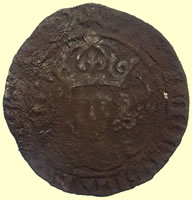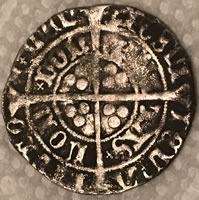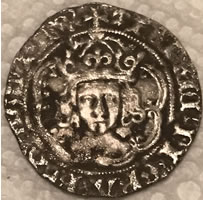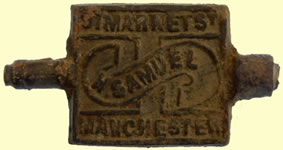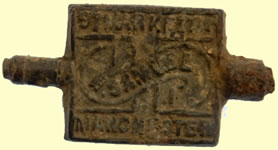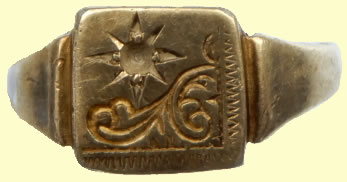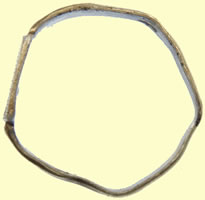

Metal detecting holidays in England with the World's most successful metal detecting club.
Twinned with Midwest Historical Research Society USA
2017 Sept finds |
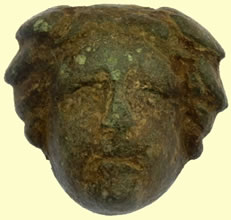 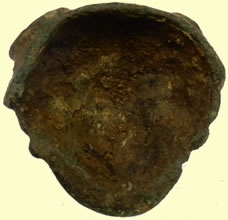 |
|||
| Roman bronze vessel mount | |||
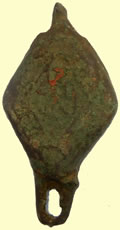  |
 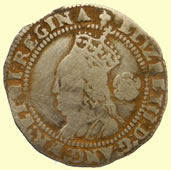 |
||
| Medieval gilded enameled harness pendant - Red enameled lion prancing left in lozenge - green enamel and gilding remains | 1573 Elizabeth 1st hammered silver three pence- Acorn mint mark | ||
 |
 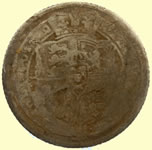 |
||
| A Medieval (1250-1450) sheet copper alloy (0.50mm thick) domed sexfoil belt mount with a central perforation.The base of each foil is curved and turns slightly upwards. | 1817 George III milled silver sixpence | ||
 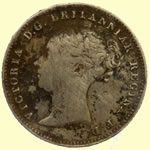 |
 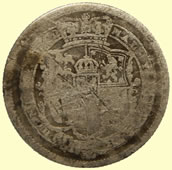 |
||
| 1835 Victoria milled silver four pence | 1816 George III milled silver shilling | ||
1979 London hall mark 9 carat gold ring - 25mm,3.92g |
|||
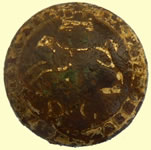 |
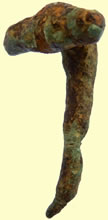 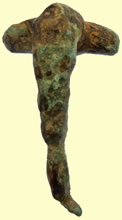 |
||
| Stunning find, 5th Dragoons guards buttons - Crimean war period - unrecorded in any ref book - | Huge 2ndC Roman fibular brooch | ||
 |
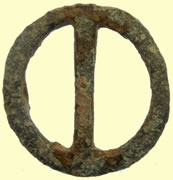 |
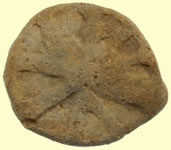 |
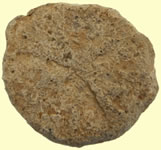 |
| 1500-1700 mount | Medieval annular buckle | 15thC lead token | 15thC lead token |
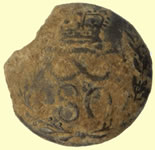 |
 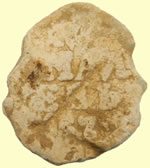 |
||
| The 80th Regiment of Foot (Staffordshire Volunteers) was an infantry regiment of the British Army, raised in 1793. Under the Childers Reforms it amalgamated with the 38th (1st Staffordshire) Regiment of Foot to form the South Staffordshire Regiment in 1881. | 1813 Russian lead bale seal | ||
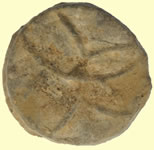 |
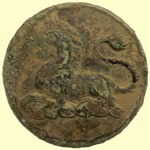 |
 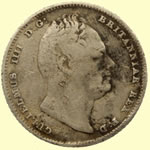 |
|
| 17thC lead token | 19thC livery button | 1835 William IV milled silver sixpence | |
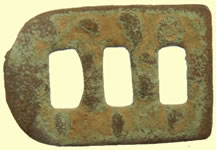 |
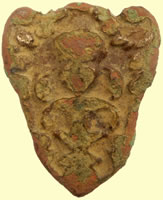 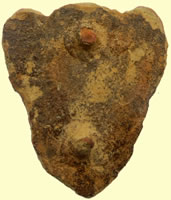 |
||
| 18thC clog fastener | 1500-1700 Cherub mount | ||
 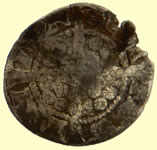 |
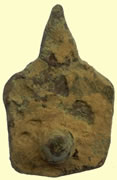 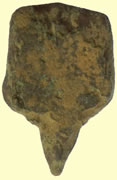 |
||
Medieval Edward hammered silver long cross penny Rev CIVI/TAS/LON/DON - London mint |
Medieval mount | ||
Monster gold coin find fixed 1351-1352 Edward III gold noble -series C- E in centre of reverse cross - Closed E & C's - Lombardic M - reverse Roman N -annulet stops to reverse Obv EDWARD DEI GRA REX ANGL Z FRANC D hYB Ref Spink 1483 -JJ North 1144 33.46mm, 7.67g |
|||
Fixed Medieval gold finger ring - no marks - reported as treasure to museum and disclaimed 1.99g, 28mm |
|||
Fixed 1591 Elizabeth 1st hammered silver sixpence
Fixed 1560-1 Elizabeth 1st hammered silver groat - Martlet mint mark |
|||
Ottoman hammered gold coin - Suleyman I The Magnificent 1520-1566 |
|||
1500-1550 Henry VII to Henry VIII trade weight 40mm dia, 21.8g (0.769oz) Obv Crown h |
|||
 |
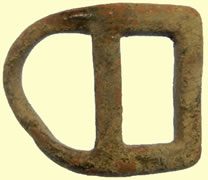 |
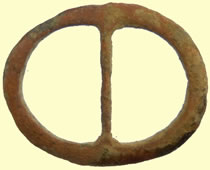 |
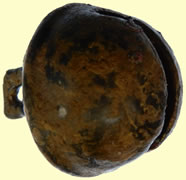 |
| WWII Army cap badge | 1550 -1720 buckle | 1500-1650 buckle | 18thC crotal bell |
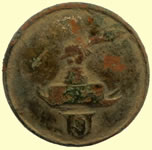 |
 |
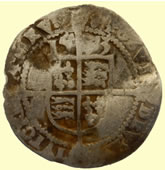 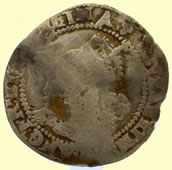 |
|
| 19thC livery button | Cadet button | 1573 Elizabeth 1st hammered silver three pence- Acorn mint mark | |
 |
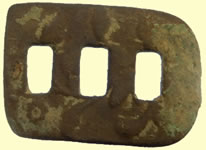 |
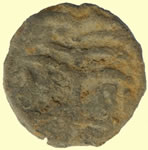 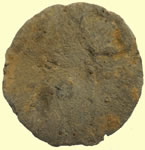 |
|
| Napoleon lead figurine | 18thC clog fastener | 17thC lead token | |
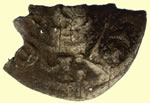 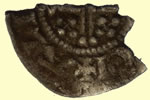 |
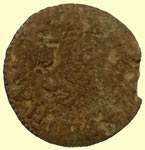 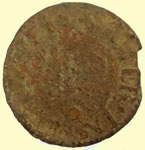 |
||
1199 John hammered silver short cross half penny - Class 5b-c Rev CI+ AL- Moneyer Alisandre of Ipswich mint
|
1656 Samuel Salter of Dedham Copper trade farthing | ||
16thC Tudor gold and silver pin head - reported as treasure to museum 3.05g,10mm dia |
|||
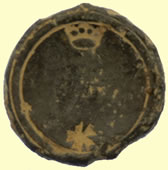 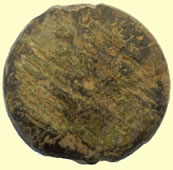 |
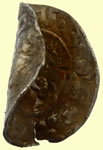  |
||
| c1422 trade weight - earliest example with single crown stamped incuse | 1180 -1189 Henry II hammered silver short cross penny - Class Ib Obv HENRICVS REX Rev .ON. C(AR + ALE(IN - Moneyer Alein of Carlise mint |
||
 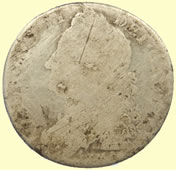 |
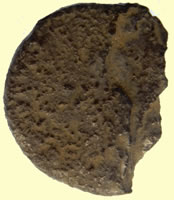 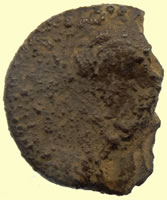 |
||
| 1745 George II milled silver shilling | Crusty 2ndC Roman silver coin | ||
|
|||
1809 Surry Militia Officers button Early spelling of Surrey the county Originally instituted for home defense, the Militia, continuing the tradition of the feudal levies and later the trained bands, developed into a reserve for the Regular Army. Towards the end of the Napoleonic War, the Local Militia was established to augment the Regular Militia. The 4th and 5th Surrey Local Militia was formed in 1813 and disbanded in 1816. |
|||
10-40 AD Cunobelin Celtic gold stater - 'linear' series, VA 1925-1. The earliest of the rule, perhaps from c. 20 AD 5.45g,16mm |
|||
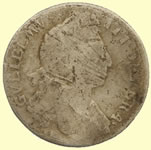 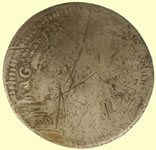 |
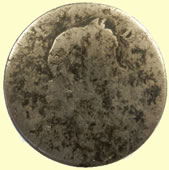 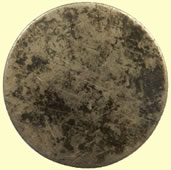 |
||
| 1697 William III milled silver sixpence | 1660-1685 Charles II milled silver sixpence | ||
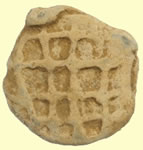 |
 |
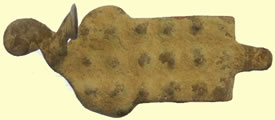 |
|
| 17thC lead token | Georgian watch winder | 18thC clog fastener | |
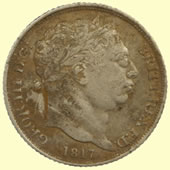 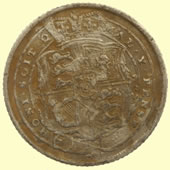 |
 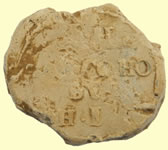 |
||
| 1817 George III milled silver shilling | 1759 St Petersburg Russian lead bale seal | ||
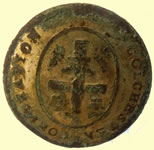 |
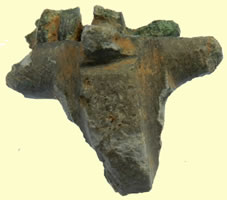 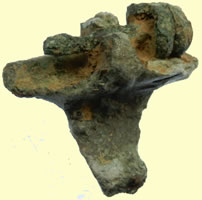 |
||
| 19thC Colchester Corporation | 2ndC Roman head stud type fibular brooch | ||
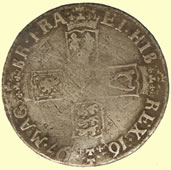 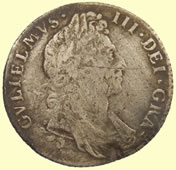 |
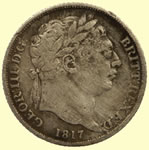 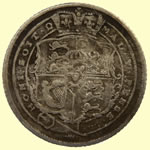 |
||
| 1697 William III milled silver shilling | 1817 George III milled silver sixpence | ||
 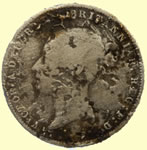 |
 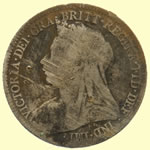 |
||
| 1850 Victoria milled silver sixpence | 1896 Victoria milled silver sixpence | ||
 |
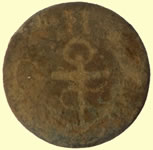 |
 |
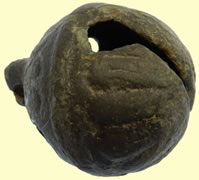 |
| Capt / Commander - 1774-1787 RN Master & Mate - 1787-1807 RN Surgeon - 1787-1805 |
RN Greenwich Hospital Service Officer's Hospital Staff Tunic Button In use 1800 - 1815 |
20thC British Railways button | 17thC crotal bell |
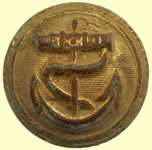 |
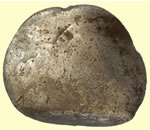 |
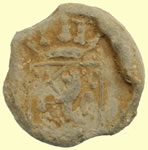 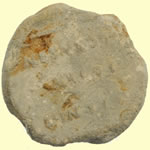 |
|
| 20thC Generic Merchant Navy Officers | 17thC William III milled silver sixpence | 17thC Dutch lead bale seal | |
 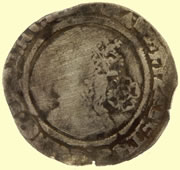 |
 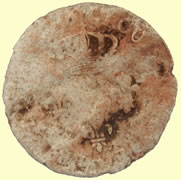 |
||
| 1566 Elizabeth 1st hammered silver three pence - Portcullis mint mark | 1779 French 3 sols milled billon silver Obverse3 lis flowers with a crown on top of them. Lettering: LOUIS XVI·R·DE FR·ET·DE·NAV· ReverseDenomination and date. Lettering:
|
||
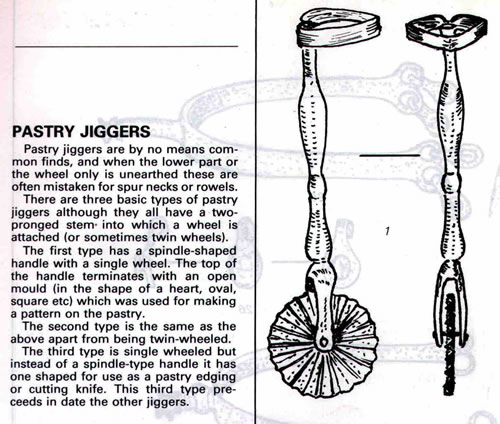   |
|||
| Georgian pastry jigger | |||
Large Roman champlevé enamel inlay fragment- reminds me of Terret ring size Possible large zoomorphic brooch
|
|||
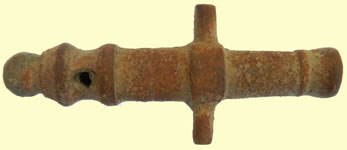 |
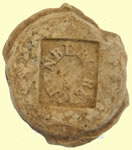 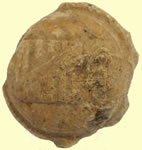 |
||
| 18thC toy cannon | Post medieval lead bale seal | ||
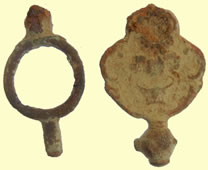  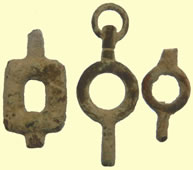 |
|||
| Georgian watch winders | |||
 |
|||
Tiny Medieval jester/rumbler bell The circular bell is made up of four petal-like tabs folded at the base with a small ‘pea’ inside that is no longer loose. On top is an integral circular attachment loop and decorating the body of the bell, from the attachment loop to the base, are four vertical strips of raised chevron decoration. |
|||
Very interesting gilded copper mount with woman prone facing left. Not sure of date yet as it has the material construction for typical gilded Anglo Saxon but the features of Roman design |
|||
Victorian period - Switzerland 900 silver watch case - Bear hall mark- 900 stamp
'Alfons Arens Jule' name engraved on back Sometimes a standard of fineness of 900‰ or 0.900 is seen. This was never introduced into Swiss law as a standard, but 900 fineness silver was a popular grade because it was the standard of coin silver in a number of European and other countries. The precious metals act of 1880 specified for silver the higher standard of fineness of 875‰ and higher. There was nothing to stop manufacturers making watch cases from 900‰ silver, stamping them "900" as shown in the picture here, and submitting them for assay and hallmarking. The "bear" was used for silver 875‰ and higher, independent the actual fineness, so this mark was applied to the item as shown in the picture — the faint mark above the 900 is the bear. The bear did not guarantee that the item was 900‰, only that it was at least 875‰. |
|||
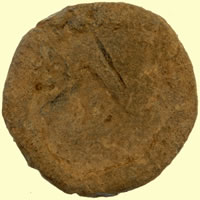 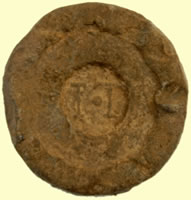 |
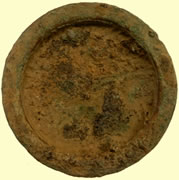 |
||
| 17thC lead trade weight | Georgian trade weight | ||
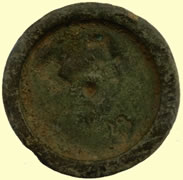 |
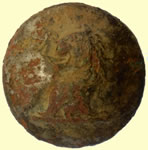 |
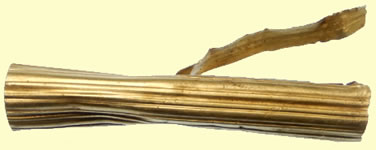 |
|
1703 Queen Anne trade weight Crown A cipher |
19thC livery button | Victorian gold propelling pencil shaft | |
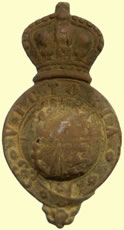 |
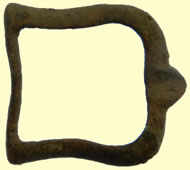 |
 |
|
| Victorian Army badge | 1500-1650 buckle | Crown BR regiment ? | |
 |
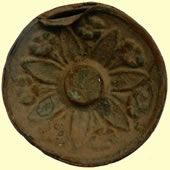 |
 |
 |
| Medieval lead gaming token | Georgian mount | WWII Royal Air Force cap badge | Post medieval copper finger ring |
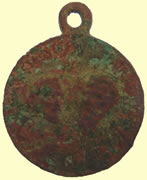 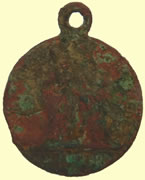 |
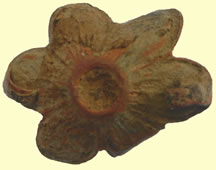 |
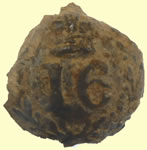 |
|
| Victorian religious medallion | Georgian mount | 16th Regiment of foot 1782-1809 |
|
1818 George III milled silver half crown (30 pence) |
|||
 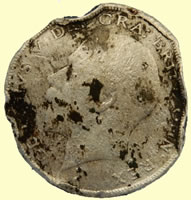 |
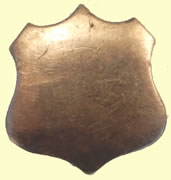 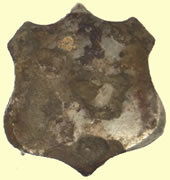 |
||
| 1933 George V milled silver half crown | Gold plated Victorian mount | ||
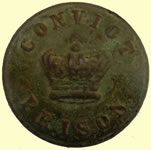 |
|||
They were uniform buttons for prison wardens. Convicts were transported to West Australia (for the most part) from 1850 to 1868. The front has a Queen Victoria crown (1837-1901) as well as the words ‘Convict prison’. |
|||
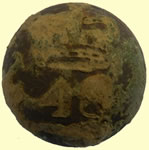 |
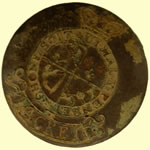 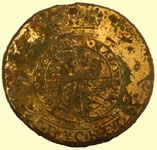 |
||
| 1810 THE 43rd LIGHT INFANTRY. / After 1881 :- 1st Battalion The Oxfordshire & Buckinghamshire Light Infantry) | One piece Navy buttons HONI SOIT QUI MAN Y PENSE PACKET Honi soit qui mal y pense (Old French: shame upon him who thinks evil of it) RN - Packet Service c.1800-1811 |
||
 |
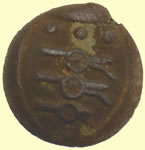 |
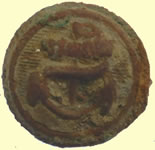 |
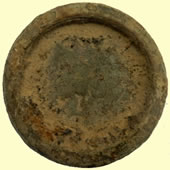 |
| 18thC Royal Artillery button | 18thC Royal Artillery button | 20thC generic merchant navy button | Victorian 1 oz trade weight |
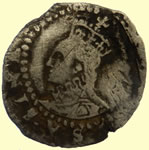 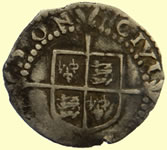 |
 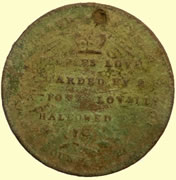 |
||
| 1560-1 Elizabeth 1st hammered silver penny - Cross Crosslet mint mark | King William IV coronation medallion Sept 8th 1831 Obv Proclaimed June 28th 1830, Crowned Sept 8th 1831 Rev Crowned with their Peoples love guarded by a nations loyalty hallowed by their countrys bless |
||
1260 AD Non Heraldic lead personal seal
|
|||
 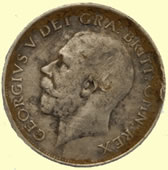 |
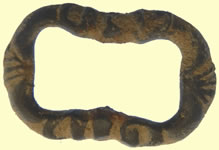 |
 |
|
| 1917 George V milled silver shilling | 1550 -1720 buckle | 19thC livery button | |
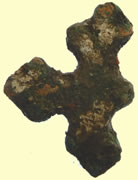 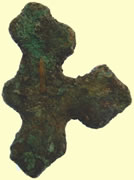 |
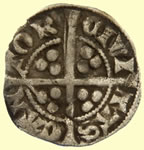 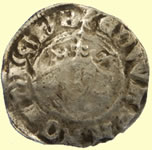 |
||
| Medieval gilded mount | 1279 Edward 1st hammered silver long cross penny Obv + EDWAR ANGL DNS hYB Rev CIVI/TAS/CAN/TOR - Canterbury mint |
||
BC Republican Roman silver - needs cooking to remove crust 17mm, 3.56g This one isn’t “Republican”, strictly speaking – it belongs to the vague, in-betweensy period typically called “Imperatorial”, but which is not all that well-defined in time. It ends, definitively, with the accession of Augustus to the Imperial throne in 27 B.C. – when, exactly, it starts depends on who you are asking, but this era contains the rules of Julius Caesar, Pompey, Marcus Antonius, The “Triumvirates”, etc. |
|||
Medieval silver annular brooch - reported a as treasure to museum 2.07g, 26.5mm dia |
|||
Cooked Roman BC republican silver coin - sent for ID Obv Helmeted bust facing right Rev Chariot and horses facing right |
|||
2ndC Roman silver - needs cooking to remove crust - sent for ID as is an interesting legend under the reverse figure This is one of the early “adoptives” – I’m guessing Trajan or possibly Hadrian – the letters you see in the exergue are describing the device since the long string of titles of the emperor is continued on the reverse “SPQR OPTIMO PRINCIPI…” etc. Okay, now having cracked a book, I can tell you with fair certainty this is a Denarius of Trajan – at least I’d be surprised if it turns out not to be. The bit in the exergue is “ARAB ADQ” marking the acquisition of Arabia in c. 106 – the reverse shows a personification of Arabia standing facing holding branch and bundle of cinnamon sticks, camel at her feet to left. This type dates to c. 113 AD. Like this: Mark |
|||
 |
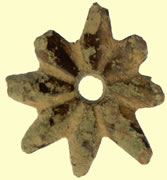 |
 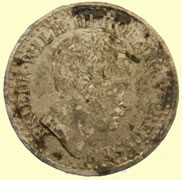 |
|
| 1500-1700 mount | Medieval spur rowel |
1 Silbergroschen 1827 D Brandenburg-Preußen Friedrich Wilhelm III.
|
|
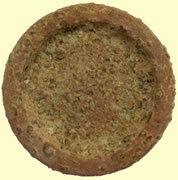 |
 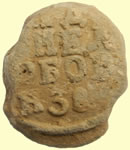 |
||
| Georgian trade weight | 1814 Russian lead bale seal | ||
10-40 AD Cunobelin Celtic silver unit- cooking to remove crust |
|||
|
|
||
| Interesting strap end ?? Brief case clap ? | Medieval book clasp | ||
 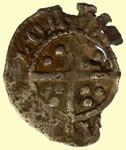 |
|
||
1485- 1509 Henry VII 'brushed hair' type hammered silver halfpenny Rev CIVI/TAS/LON/DON - London mint |
Interesting Georgian widget ? | ||
  |
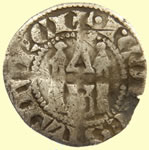 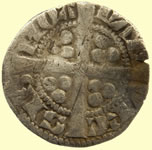 |
||
1247 Henry III hammered silver voided half penny Rev NLV/RIC - - Moneyer Ricard of London mint |
Foreign hammered silver penny Jean 1 1297-1331 Obv +I.COMES NAMVR CI Rev MOA NAM VRC SIS Esterlin of John I of Namur (in modern Belgium) I found it in the "Künker Auktion 121 - The De Wit Collection of Medieval Coins" on page 494 Ohio Drew |
||
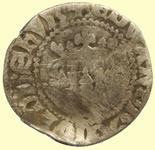 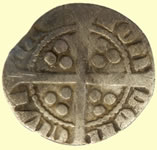 |
 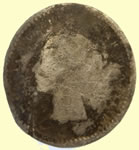 |
||
1299-1300 Edward 1st hammered silver penny - Class 9b - pot hook N Crown 9a2 Obv + EDWAR ANGL DNS hYB Rev CIVI/TAS/LON/DON - London mint |
1839 Victoria milled silver one and half pence - Colonial use | ||
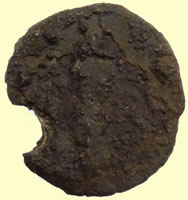 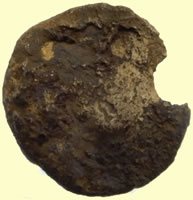 |
|||
| 2ndC Roman silver coin - needs cooking to remove crust | |||
|
|||
| Georgian seal ring pipe tamper with integral bowl cleaner | |||
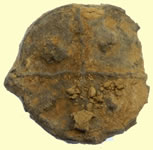 |
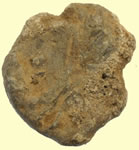 |
  |
|
| 15thC lead token - type 2 | 15thC lead token - type 2 | Roman mount | |
Picture at the British museum A complete copper-alloy Roman pin of probable mid first to mid second century date
Roman decorated stick pin |
|||
 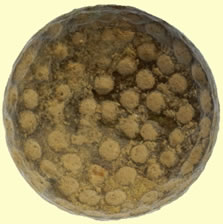 |
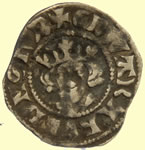 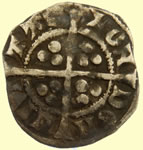 |
||
| Medieval beehive thimble | 1279 Edward 1st hammered silver penny Obv + EDWAR ANGL DNS hYB Rev CIVI/TAS/LON/DON - London mint |
||
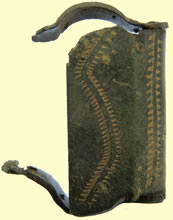 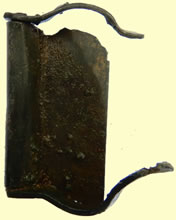 |
|
||
| Medieval decorated buckle plate | Medieval riveted strap end | ||
|
|||
| 1636 Charles 1st hammered copper rose farthings | |||
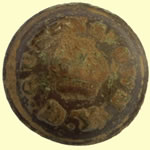 |
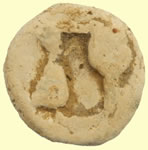 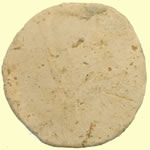 |
||
British, Queen's Own Dorsetshire YeomanryThe Queen's Own Dorset Yeomanry was a yeomanry regiment of the British Army founded in 1794 as the Dorsetshire Regiment of Volunteer Yeomanry Cavalry in response to the growing threat of invasion during the Napoleonic wars. It gained its first royal association in 1833 as The Princess Victoria's Regiment of Dorset Yeomanry Cavalry, and its second, in 1843, as the Queen's Own Regiment of Dorset Yeomanry Cavalry
Obv Queens Own D.Y |
16thC Elizabethan illegal tavern lead token | ||
 |
 |
||
| Post medieval strap decoration - dog | 16thC Tudor button | ||
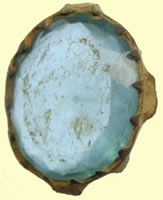 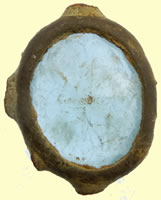 |
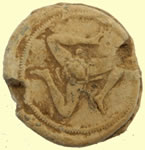 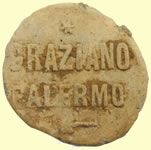 |
||
| Georgian glass jewelry fragment | Post medieval lead Italian bale seal | ||
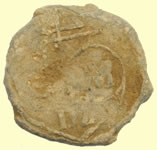 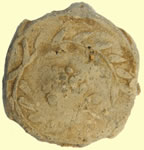 |
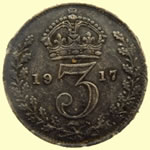 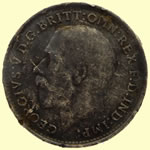 |
||
| Post medieval lead East India company bale seal | 1917 George V milled silver three pence | ||
 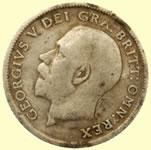 |
  |
||
| 1914 George V milled silver six pence | 1247 Henry III hammered silver voided long cross half penny | ||
Medieval seal matrix - fox facing right Needs more cleaning yet Legend PRIVE SV |
|||
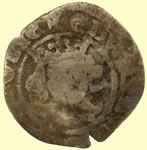 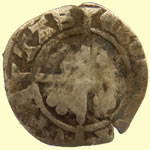 |
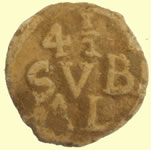 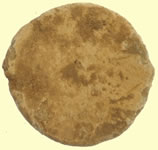 |
||
1327 Edward III hammered silver penny - Pre or post treaty Obv + EDW ******GLIE Rev CIVI/TAS/EBO/RACI/ - York mint |
Unusual lead coin weight - not checked the ref books yet | ||
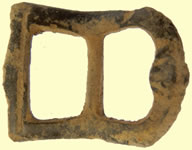 |
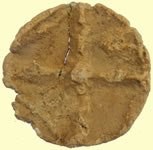 |
 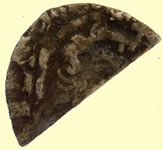 |
|
| 1500 -1650 buckle | 15thC lead token | 1247 Henry III hammered silver voided long cross half penny | |
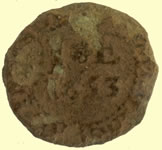 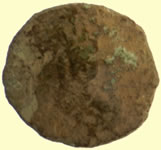 |
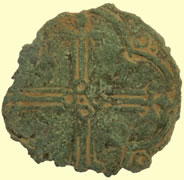 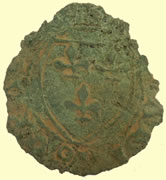 |
||
| 1653 Jeremy Erds of Manningtree Essex hammered copper trade farthing | French copper alloy Jeton 1380 AD Obv Shield of France bearing three feur de lys |
||
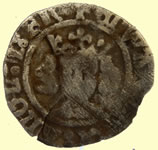 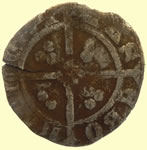 |
  |
||
1369-77 Edward III hammered silver penny -Post treaty period - double pellet stops - York class 1 - quatrefoil with pellet at centre of reverse cross Obv + EDWA **ANGL:F:FR Rev CIVI/TAS/EBO/RACI/ - York mint |
1247 Henry III hammered silver voided long cross half penny Rev OLE/ONL - Moneyer Nicole of London mint |
||
 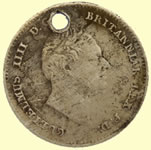 |
 |
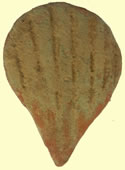 |
|
| 1836 Williasm IV milled silver four pence | George silver spoon hamdle with monogram ES | ||
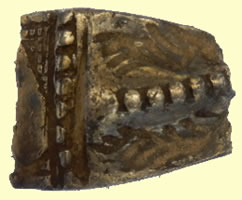 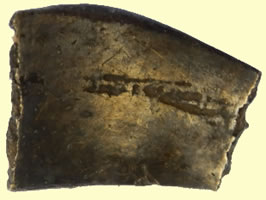 |
|||
| 16thC Tudor gilded silver ring fragment - reported as treasure to museum | |||
 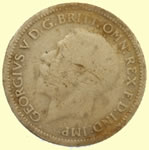 |
 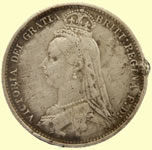 |
||
| 1928 George V milled silver sixpence | 1889 Victoria milled silver sixpence | ||
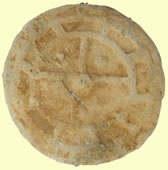 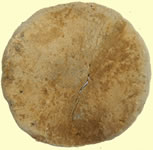 |
 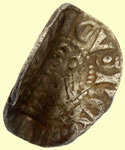 |
||
| Medieval lead boy bishop token | 1247 Henry III hammered silver voided long cross penny Obv hENRICVS REX Rev REN/AVD/ONL/VND/ - Moneyer Renavd of London mint |
||
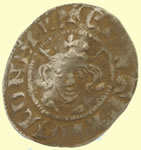 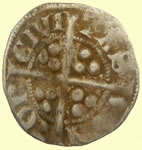 |
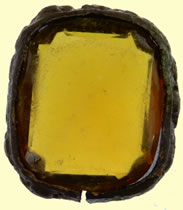 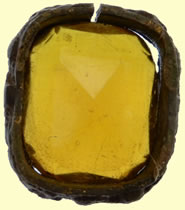 |
||
1300- 1310 Edward 1st hammered silver penny - Class 10ab Obv + EDWAR ANGL DNS hYB Rev CIVI/TAS/CAN/TOR - Canterbury mint |
Georgian fob chain decoration | ||
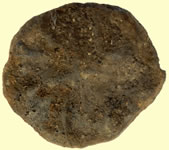 |
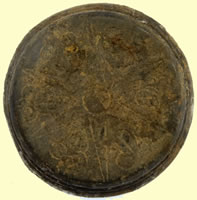 |
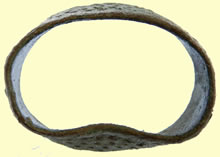 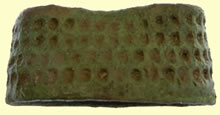 |
|
| 15thC lead token | 17thC mount | 15thC open topped thimble | |
 |
  |
||
| Victorian lead toy horse | Post Medieval cast copper alloy mount dating to the 16th - 17th century. The mount has an roughly piriform (drop shaped) front with projecting knops top and bottom. The mount and knops are convex with a concave back and there are thinned constrictions between the centre and knops. The knop at the top is larger, triangular with four incised lines on the front and a scalloped outer edge giving the effect of five rays; The lower one is oval with four incised lines which are more parallel and again a scalloped outer edge. On the reverse there are the stubs of two integral but broken spikes, one each at the necks where the knops join the centre. | ||
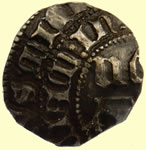 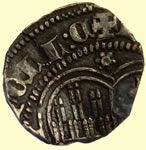 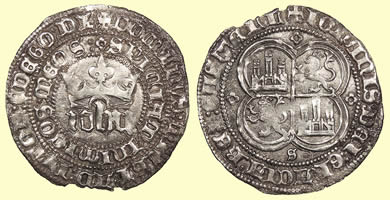 |
|||
Foreign hammered silver coin SPAIN Castille & Leon Juan (John) I 1379-1390 RealCrown over 'iohn'; annular legends around. +DOMINVS MICHI ADIVTOR ED EGO, DI / SPICIAM INIMICOS MEOS Quartered arms within quatrilobe; rosettes around, 'S' mintmark below. +IOHANES DEI GRACIA REX CASTELL |
|||
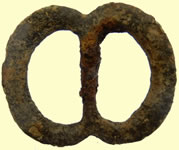 |
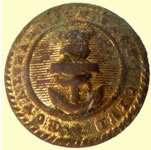 |
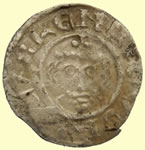 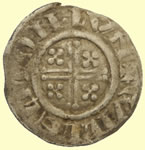 |
|
| 1500- 1650 buckle | Victorian Royal Eastern Yacht club | 1204-5 John hammered silver short cross penny - Class 5b Obv hENRICVS REX Rev +WILLEM T.ON.LVN - Moneyer Willelm T of London mint |
|
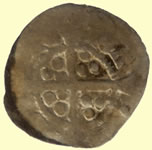 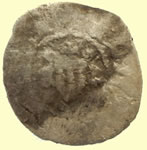 |
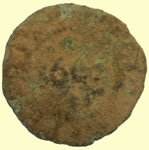 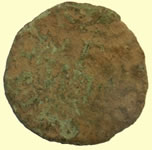 |
||
1351-61 Edward III hammered silver farthing Obv +EDWA***** Rev CIVI/TAS/LON/DON - London mint |
1665 William Ferris of Colchester Essex hammered copper trade farthing | ||
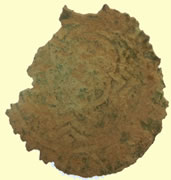 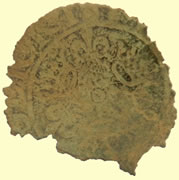 |
  |
||
1601 Wolf Laffer Rose Orb jetton Obv Three crowns and 3 Lis centrifugally around central rose Rev Imperial orb |
1247 Henry III hammered silver voided long cross half penny Rev ONC/ANT - Canterbury mint |
||
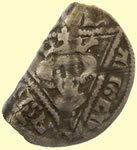 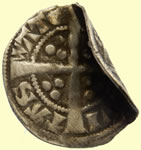 |
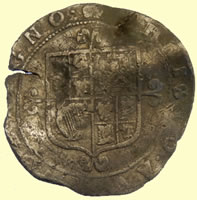 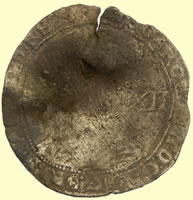 |
||
1279 - 84 Irish Edward 1st hammered silver penny Obv EDWR ANGL DNS HYB Rev CIV/TAS/WATE/RFOR - Waterford mint |
1645 Charles 1st hammered silver shilling (12 pence)- Eye mint mark | ||
 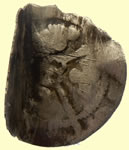 |
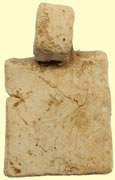  |
||
Medieval hammered silver long cross penny Quatrefoil with pellet at centre of reverse cross - York mint |
|||
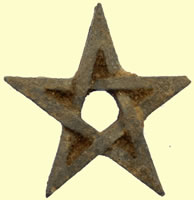 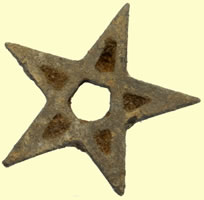 |
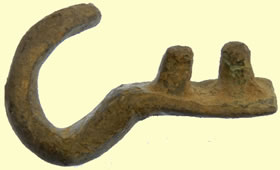 |
||
| Post medieval spur rowel ?? | Roman harness loop junction - 2 rivet fixing | ||
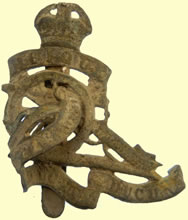 |
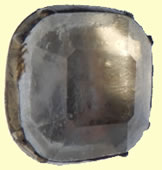  |
||
| WWI Royal Artillery cap badge | Georgian silver button with glass stone | ||
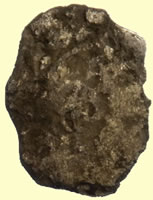 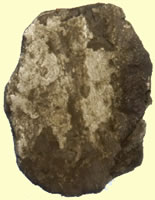 |
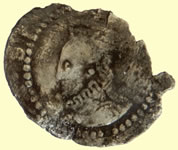 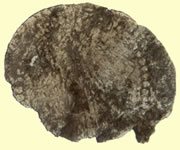 |
||
| 5thC Roman silver coin fragment | 16th C Elizabeth 1st hammered silver penny | ||
17thC seal matrix - heart and arrows inscription |
|||
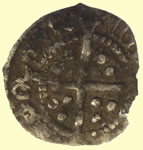 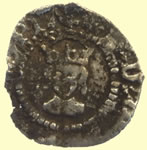 |
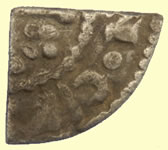 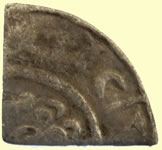 |
||
1526- 44 Henry VIII hammered silver halfpenny - 2nd coinage rev cross fourchee - Type 3 single arched crown Obv hxDxGxROSAxSIExSPIA Rev CIVI/TAS/LON/DON - London mint
|
1216 Henry III hammered silver short cross farthing Rev N.CA - Canterbury mint |
||
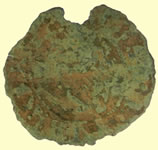 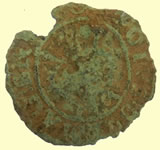 |
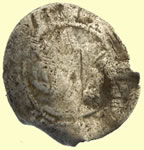 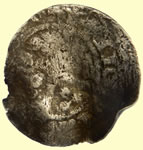 |
||
Charles 1st Royal farthing - Harp Type 3 Maltravers 'rounds' 1634- 36, woolpack mint mark obv CAROLUS D G MAG BRIT Rev FRAN ET HIB REX |
1279 Edward 1st hammered silver penny Obv + ED****** hYB Rev **EME*** - Durham mint |
||
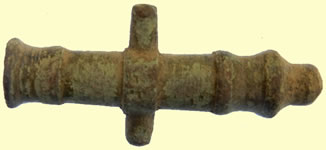 |
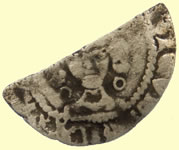  |
||
| 18thC toy cannon | 1422-27 Henry VI First reign hammered silver penny Annulets by neck, annulets in centre of pellets in 2 qtrs Rev VILLA/CAL/ISIE - Calais mint |
||
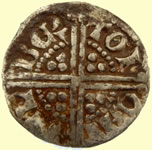 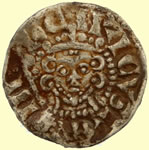 |
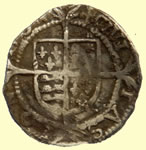 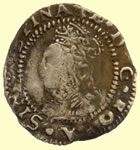 |
||
1247 Henry III hammered silver voided penny- Class 5b Rev GIL/BER/TON/C(AN - - Moneyer Gilbert of Canterbury mint |
1560-1 Elizabeth 1st hammered silver penny -Cross Crosslet mint mark | ||
50 - 20 BC Essex Wheels quarter, VA 260, BMC 485 and 496, ABC 2231 - sent to museum for recording 1.41g,15.1mm |
|||
 |
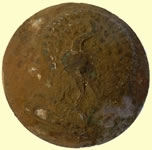 |
 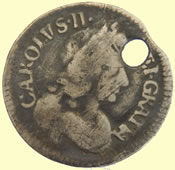 |
|
| 16thC Tudor clothing fastener | 19thC livery button | 1679 Charles II milled silver three pence | |
45 BC to 25BC Addedomarus - Trinovantian tribe Celtic gold qtr stater - sent to PAS for recording 1.32g,13.23mm |
|||
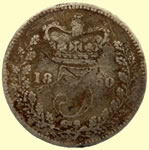 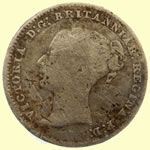 |
 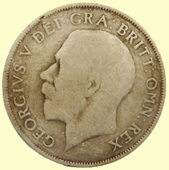 |
||
| 1840 Victoria milled silver three pence | 1922 George V milled silver shilling | ||
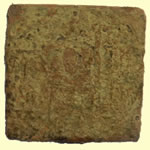 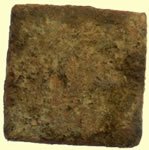 |
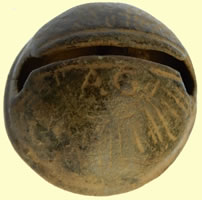 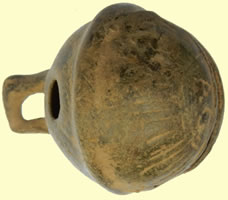 |
||
| 1351-1412 British Ryal - King with sword and shield standing in a ship type coin weight | 17thC Andrew Gurney of Hull crotal bell | ||
|
 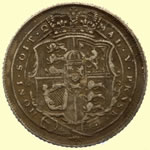 |
||
| Medieval book clasp | 1819 George III milled silver sixpence | ||
 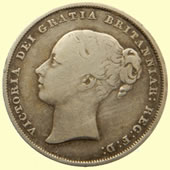 |
 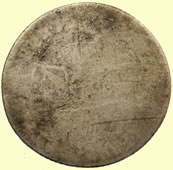 |
||
| 1856 Victoria milled silver shilling (12 pence) | 1696 William III milled silver shilling | ||
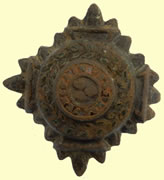 |
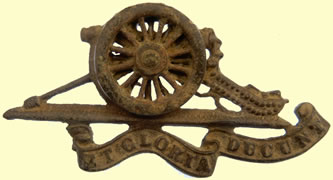 |
||
| WWI - Army officers rank pip | WWI Royal Artillery cap badge | ||
Interesting gilded silver mount fragment - reported as possible treasure to museum Initial musuem ID as late medieval |
|||
1605-6 James 1st hammered silver shilling - Rose mint mark 5.65g,29.83mm |
|||
What a stunning find - soaking to remove the soil - each raised section is 4mm deep Not an obvious fixing for a brooch, more like a mount. Nothing so far in my reference books, at a guess Early medieval in date 36.6mm high, 7.16mm thick, 16.17g Initial ID from the museum is early medieval also. |
|||
Interesting coin dug in pasture land so one face exposed to oxygen- one face has horn silver crust that needs 'cooking' to remove crust 1493- 1498 Henry VII hammered silver groat- Two arches unjewelled - Type 3b I.m pansy, new bust Rev CIVI/TAS/LON/DON - Satire stops - London mint Cooked by Dan |
|||
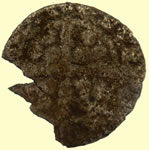 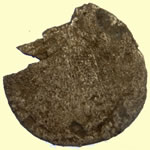 |
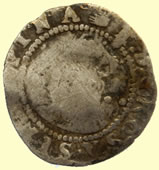 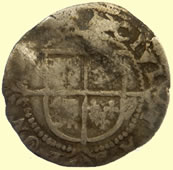 |
||
| Medieval hammered silver long cross penny | 1590-1592 Elizabeth 1st hammered silver half groat - hand mint mark | ||
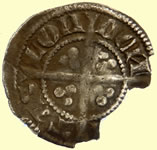 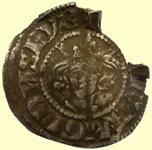 |
|
||
1279-80 Edward 1st hammered silver long cross penny - Reversed barred N - Class 2b Obv ** R ANGL' DNS hYB Rev CIVI/TAS/LON/DON - London mint |
Georgian watch winder - advertising H.Samuel Manchester | ||
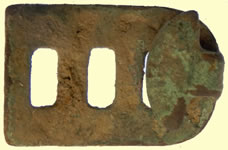 |
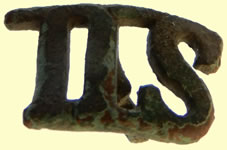 |
||
| 18thC clog fastener | WWII Army lapel badge | ||
 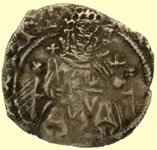 |
|
||
1485 -1509 Henry VII hammered silver sovereign penny - DR by shield Throne has one pillar Bishop Fox - Durham mint |
20thC signet ring - 9 carat gold giled silver ring 18.17mm,1.27g |
||
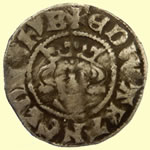 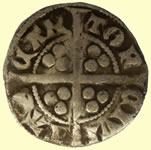 |
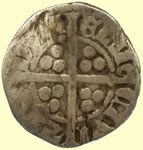 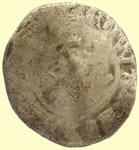 |
||
1279 Edward 1st hammered silver long cross penny Obv EDWAR ANGL DNS hYB Rev CIVI/TAS/CAN/TOR - Canterbury mint |
1335 -1343 Edward III hammered silver long cross penny - Florin issue Obv EDWAR ANGL DNS hYB Rev CIVI/TAS/DVN/ELMI - Durham mint |
||
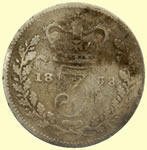 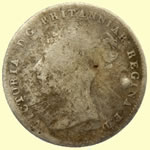 |
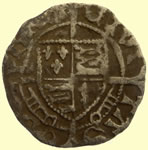 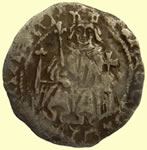 |
||
| 1838 Victoria milled silver three pence | 1485 Henry VII hammered silver sovereign penny - Keys by shield - Archbishop Rotherham - pillars to throne York mint |
||
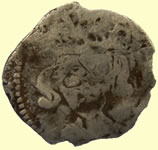 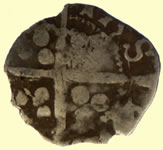 |
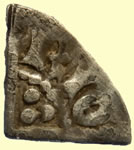 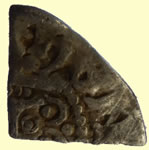 |
||
| Medieval hammered silver long cross penny | 1247 Henry III hammered silver voided farthing Rev RIO - Moneyer Henri |
||
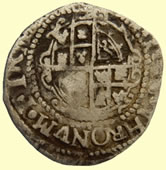 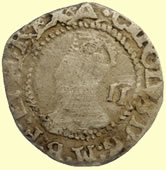 |
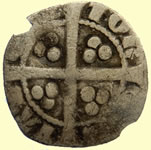 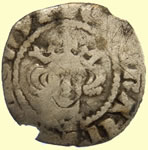 |
||
| 1639-40 Charles 1st hammered silver hammered silver half groat- triangle mint mark | 1299-1300 Edward 1st hammered silver long cross penny - Pot hook N - Class 9b Obv EDWR ANGL DNS hYB Rev CIVI/TAS/CAN/TOR - Canterbury mint
|
||
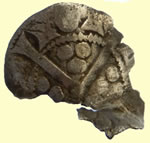 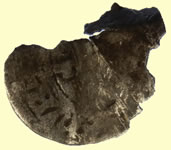 |
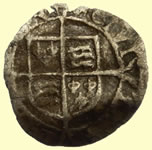 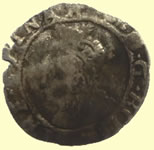 |
||
Medieval hammered silver long cross penny Obv ***hYB |
16thC Elizabeth 1st hammered silver penny | ||
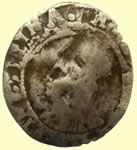 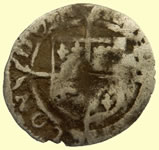 |
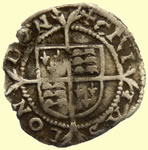 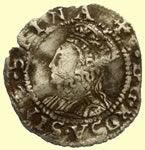 |
||
| 1569-71 Elizabeth 1st hammered silver penny -Castle mint mark | 1560-1 Elizabeth 1st hammered silver penny- Cross crosslet mint mark | ||
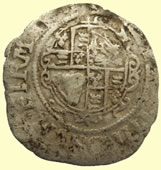 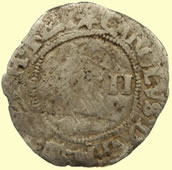 |
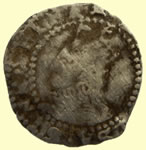 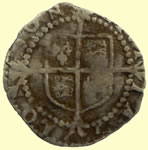 |
||
| 1640-1 Charles 1st hammered silver half groat - star mint mark | 1594-6 Elizabeth 1st hammered silver penny- Woolpack mint mark | ||
 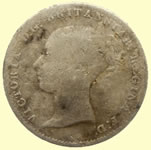 |
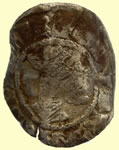 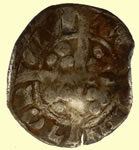 |
||
| 1859 Victoria milled silver three pence | 1279 Edward 1st hammered silver long cross penny - Obv EDWR ANGL DNS hYB Rev CIVI/TAS/CAN/TOR - Canterbury mint |
||
Check out 2017 Feb finds pageCheck out 2017 March finds pageCheck out 2017 Oct finds page |
|||
 |
|||
